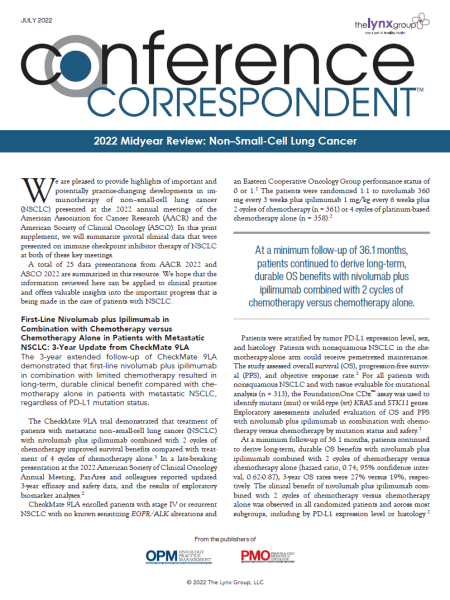In 2020, 2 oral drugs—selpercatinib and pralsetinib—were approved for use in adults with metastatic RET fusion–positive NSCLC.
RET gene fusions are targetable oncogenic drivers in multiple tumor types, including NSCLC. Selpercatinib (Retevmo) and pralsetinib (Gavreto) are inhibitors of oncogenic RET alterations.1,2
Selpercatinib was studied in patients with RET fusion–positive NSCLC in the phase 1/2 LIBRETTO-001 trial, a global, multicenter study.1 Following the phase 1 dose-escalation portion of the trial, patients received the recommended dose of selpercatinib (160 mg orally twice daily).1 The primary study end point was ORR, while secondary end points included DOR and safety.1 Among platinum-treated NSCLC patients (median of 3 previous systemic regimens), selpercatinib’s ORR by investigator assessment was 70%.1 Responses did not differ by fusion partner or number or type of previous therapies.1 The median DOR was 20.3 months with 62% of 73 responders censored at a median follow-up of 14.8 months.1 Among 39 treatment-naïve patients with NSCLC who received selpercatinib, the ORR by investigator assessment was 90%, including 2 responses pending confirmation.1 Median DOR was not reached with 82% of 33 confirmed responses ongoing after median follow-up of 7.4 months.1
Among 702 patients who received selpercatinib for any tumor type, the most common treatment-related AEs that occurred in ≥15% of patients were dry mouth (33%), increased aspartate transaminase (25%), increased alanine aminotransferase (24%), hypertension (23%), diarrhea (20%), and fatigue (17%).1 Two percent of patients discontinued selpercatinib for treatment-related AEs.1
In the phase 1/2 ARROW study, pralsetinib (400 mg orally each day) demonstrated an ORR of 73% in 26 treatment-naïve patients and 61% in 80 platinum-exposed patients who have RET fusion–positive NSCLC.2 ORR was similar regardless of RET fusion partner, previous therapies, or CNS involvement.2
In the safety population for pralsetinib (N = 354, including NSCLC and other tumor types), most treatment-related AEs seen with pralsetinib were grade 1 or grade 2.2 These included increased aspartate aminotransferase (31%), anemia (22%), increased alanine aminotransferase (21%), constipation (21%), and hypertension (20%).2 Four percent of patients discontinued pralsetinib because of treatment-related AEs.2
Based on their marked and durable antitumor activity in patients with RET fusion–positive NSCLC, selpercatinib and pralsetinib were approved for use by the US Food and Drug Administration in 2020.3,4
References
1. Goto K, Oxnard GR, Tan DS, et al. Selpercatinib (LOXO-292) in patients with RET-fusion+ non-small cell lung cancer. J Clin Oncol.2020;38(15_suppl). Abstract 3584.
2. Gainor JF, Curigliano G, Kim D, et al. Registrational dataset from the phase I/II ARROW trial of pralsetinib (BLU-667) in patients (pts) with advanced RET fusion+ non-small cell lung cancer (NSCLC). J Clin Oncol.2020;38(15_suppl). Abstract 9515.
3. US Food and Drug Administration. FDA approves selpercatinib for lung and thyroid cancers with RET gene mutations or fusions. May 11, 2020. www.fda.gov/drugs/drug-approvals-and-databases/fda-approves-selpercatinib-lung-and-thyroid-cancers-ret-gene-mutations-or-fusions. Accessed November 30, 2020.
4. US Food and Drug Administration. FDA approves pralsetinib for lung cancer with RET gene fusions. September 8, 2020. www.fda.gov/drugs/resources-information-approved-drugs/fda-approves-pralsetinib-lung-cancer-ret-gene-fusions. Accessed November 30, 2020.

